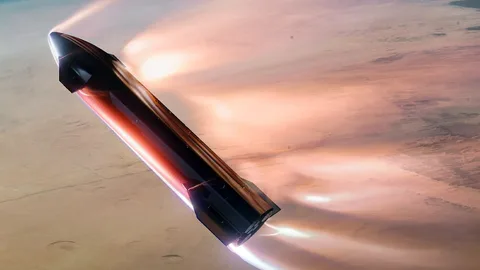Technology
Elon Musk pegs the first manned Starship flight to Mars for 2028 with a colony to follow in 20 years

Elon Musk casually revealed that he believes the first manned Starship flight to Mars would take place in 2028 when discussing the accomplishment of the first reusable spaceship and the necessity for substantially lower tonnage costs for a trip to Mars.
However, SpaceX will first deploy a Starship without a crew to test all of the landing hypotheses that the space corporation has been investigating over the last five years during the next window of opportunity for a Mars journey in 2026. In around 20 years, SpaceX hopes to establish the first “self-sustainable” community on Mars by sending more people there during each subsequent time window that is appropriate for a Mars mission.
While all this may sound like a lofty State of the Union address, for Elon Musk interplanetary flights and life on other celestial objects boil down to “a cost per ton to Mars problem.” With the current SpaceX Starship iteration, that cost is a staggering $1 billion per ton, and it needs to go down to just $100,000/ton for a trip to be commercially viable.
“Being multiplanetary will vastly increase the probable lifespan of consciousness, as we will no longer have all our eggs, literally and metabolically, on one planet,” is Musk’s main argument when he has to defend the exorbitant costs and risk involved in trying to colonize other planets, even one as close as Mars. According to Elon Musk‘s biography by Walter Isaacson, he began banging the space drum in 2001 when he was shocked to discover that NASA has no real plans for a Mars mission.
After establishing SpaceX, they chose Mars for the first interplanetary colony mission because of the CO2-laden atmosphere able to sustain plant life when compressed, a comparable day length, and the fact that gravity is less than half of that on Earth so that humans there would be able to “lift heavy things and bound around.”
The Starship’s reusable tanks will be refilled with fuel in Earth’s orbit so that it can carry up to 100 tons of equipment back to Mars, while its heat shield is designed for multiple reentries at 7.5km/s with aerodynamic deceleration.
The only thing left for Musk to announce now is whether the first Mars mission of SpaceX’s Starship in the self-imposed deadline of 2026 will include Optimus robots as well.

-

 Technology2 years ago
Technology2 years agoVoIP Number: Everything You Need To Know
-

 Music1 month ago
Music1 month ago[Music] Gnash Ft Olivia O’Brien – I Hate you, I Love you
-

 Music1 month ago
Music1 month ago[INSTRUMENTAL] John Legend – All Of Me
-

 Music2 months ago
Music2 months agoAlan Walker – Faded [INSTRUMENTAL]
-

 Music1 month ago
Music1 month ago[Video] 21 Savage ft. Offset & Metro Boomin – Rap Saved Me
-

 Music1 month ago
Music1 month ago[Instrumental] Wiz Khalifa – See You Again ft. Charlie Puth
-

 ANE Stories4 months ago
ANE Stories4 months ago[STORY] AMAKA THE LESBIAN (Complete Episodes)
-

 Music2 months ago
Music2 months ago[Music] Akon – Sorry Blame It On Me














































